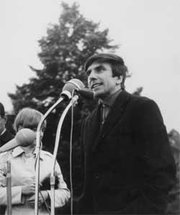Rudi Dutschke
|
|
Alfred Willi Rudi Dutschke, commonly called Rudi Dutschke (March 7, 1940 in Schönefeld - December 24, 1979, Århus, Denmark)) was the most prominent spokesperson of the German student movement of the 1960s.
On April 11, 1968 Dutschke was shot in the head by Josef Bachmann, a young unskilled worker who was influenced by the massive propaganda campaign of the mass media owned by Axel Springer, especially the headline "Stop Dutschke now!" in the Bild-Zeitung. Rudi Dutschke recovered sufficiently to play an essential role in the formation of the Green Party (established in 1980 in Germany) by convincing the former student protesters (including Joschka Fischer) to join the Green movement. As a result in October, 1979 the Greens were able to reach the 5% limit required to obtain parliamentary seats in the Bremen provincial election. Dutschke died in 1979 from an epileptic seizure as a consequence of the brain damage he had from the assassination attempt.
Rudi Dutschke attended school in his birthplace of Luckenwalde and graduated from the Gymnasium there, but because he refused to join the army of the German Democratic Republic and convinced many of his fellow students to refuse as well, he was prevented from attending university in the GDR. He fled to West Berlin in August, 1961 just one day before the Berlin Wall was built. He studied sociology at the Free University of Berlin under Richard Lowenthal and Klaus Meschkat where he became acquainted with alternative views of Marxism.
Influenced by critical theory, Rosa Luxemburg and critical Marxists, Dutschke developed a theory and code of practice of social change which did not propose a final Utopian form of society like Marx. Instead he believed that the direction, form and content of a more just and more democratic society should be developed in the process of revolutionizing society. He also believed the transformation of Western societies should go hand in hand with Third World liberation movements and with democratization in Eastern European Communist countries. His socialism always had strongly Christian roots. He called Christ the "greatest revolutionary", and at Easter 1963, he wrote in his diary, "Jesus is risen. The decisive revolution in world history has happened - a revolution of all-conquering love. If people would fully receive this revealed love into their own existence, into the reality of the 'now', then the logic of insanity could no longer continue."
An early impetus for student unrest in Germany had to do with questions that the generation born during or after the war had about what had happened under Hitler. These young people wanted to know why their parents had allowed it to happen. But they were met mostly with silence. Early protest actions were directed at removing former Nazis from high positions in the government and courts.
Rudi Dutschke joined the German SDS Sozialistischer Deutscher Studentenbund (which was not the same as the SDS in the USA, but quite similar in goals) in 1965 and from that time on the SDS became the center of the student movement, growing very rapidly and organizing demonstrations against the war in Vietnam.
Rudi Dutschke married the American Gretchen Klotz in 1966 and they had three children.
After the attempted assassination in 1968, Rudi Dutschke and his family went to England in the hope that he could recuperate there. He was accepted at Cambridge University to finish his degree in 1969, but in 1971 the Tory government expelled him and his family as an "undesirable alien" who had engaged in "subversive activity", causing a political storm in London. They then moved to Aarhus, Denmark.
Rudi Dutschke reentered the German political scene after protests against the building of nuclear power plants activated a new movement in the mid-1970s. Dutschke recognized that this movement had a far broader base than the student movement had, and that its ecological orientation was going to define the progressive direction for the next generation.
He also began working with dissidents opposing the Communist governments in East Germany, Poland, Hungary, and Czechoslovakia, including Robert Havemann, Wolf Biermann, Milan Horacek, Adam Michnik, Ota Sik and more.
Because of massive brain damage, Rudi Dutschke had health problems and on 24 December 1979 he died in Aarhus, Denmark, drowning in the bathtub after an epileptic fit.
The public assessment of Rudi Dutschke's political activities has undergone several changes, from the very aggressive condemnation by the Springer Press in the 1960s to a broad recognition today that the movement for which Dutschke was a leading spokesperson played an essential role in the democratization of German institutions in the post-World War II period.
External Link
- Biography at the German Historic Museum (German) (http://www.dhm.de/lemo/html/biografien/DutschkeRudi/)
Bibliography
- Wir hatten ein barbarisches, schönes Leben by Gretchen Dutschke (http://autorenverzeichnis.de/content/buch/d/t_dutschke_gretchen_rudi_dutschke_rowi_12201.html)de:Rudi_Dutschke

